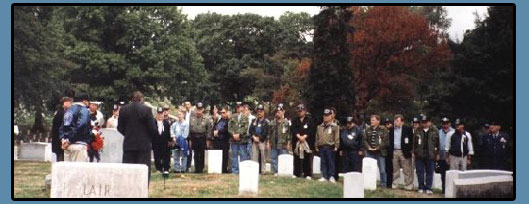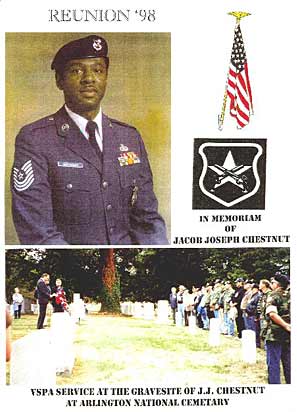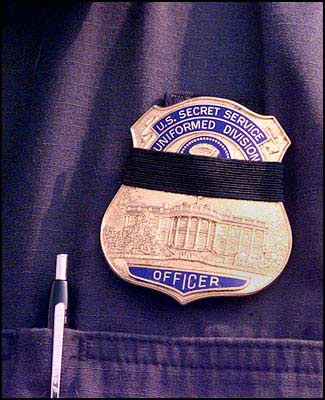Jacob Chestnut ... Vietnam Veteran and Capitol Police
Officer |
|
The Vietnam Security Police Association, Inc. (USAF) is sad to announce the death of member Jacob Chestnut. As a United States Air Force Veteran, "JJ" Chestnut retired with 20 years service. He also served two tours in the Republic of Vietnam. First with the 12th Combat Security Police (Jan-Dec. 1966), Phu Cat, and second with the 633d Combat Security Police (May 1968-May 1969), Pleiku. (USAF service photos: Jacob Chestnut; and Tribute to a Friend) Jacob Chestnut, was an 18-year veteran with the Capitol police, and Special Agent John Gibson, an 8-year veteran. Both were married and each had three children. Chestnut and Gibson were laid to rest at Arlington National Cemetery. The Army approved Capitol Police Officer Gibson's interment there, after it was requested by Gingrich and House Minority Leader Dick Gephardt. The following information regarding the Capitol building shooting is provided courtesy of NBC4LA CHANNEL 4 NEWS. This page is heavy in photos that may take a while to load. You are here to honor these slain officers, so be patient and let the photos load and you will be rewarded by what you see.
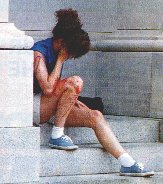
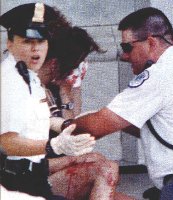
Capitol flags were ordered flown at half mast pending the burial of both Capitol Police Officers. Locally, California Governor Pete Wilson, a former U.S. senator who worked in the Capitol for years, ordered flags at all state buildings flown at half staff until the officers' memorial services are held. He also had security beefed up Friday afternoon at the Capitol in Sacramento. Slain officers to lie in Capitol Suspect upgraded to 'serious' condition A U.S. Capitol policeman and his family pay their respects Sunday at the steps of the Capitol building, honoring the two policemen who were killed there Friday. MSNBC NEWS SERVICES WASHINGTON, July 26 ' Two Capitol officers cut down in a burst of gunfire will be memorialized in the building where they worked and died and will lie in honor in the great, soaring Rotunda where the coffins of presidents and commanding generals have rested, officials said Sunday. The gunman's medical condition, meanwhile, was upgraded to serious. Coffins bearing the remains of the officers will be in the Capitol Rotunda early Tuesday and remain there all day. Officially, the slain Capitol police officers will not lie in 'state,' but in a status of congressional 'tribute.'
President Clinton, Vice President Al Gore, House Speaker Newt Gingrich and Senate Majority Leader Trent Lott all are scheduled to attend the event, officials said. Abrecht said Gibson, 42, will be buried Thursday at a location to be announced. Chestnut, 58 and an Air Force veteran, will be interred the following day at Arlington National Cemetery. The bodies of numerous high-ranking government officials have lain in the Rotunda since Abraham Lincoln's casket was brought there in 1865. Others similarly honored include Presidents John F. Kennedy, Dwight Eisenhower, as well as Gen. John J. Pershing and Adm. Douglas McArthur. House Democratic Leader Dick Gephardt, D-Mo., said the two officers should be memorialized in the Capitol. 'They gave their lives, the ultimate act that anyone can give for their fellow human beings, and we want to honor them,' he said. 'SAVAGERY' In live television broadcasts, President Bill Clinton called the Capitol firefight 'a moment of savagery' and House Speaker Newt Gingrich delivered an emotional prayer, asking God to take the officers 'to your bosom.' Weston, described as a mentally troubled man who drifted between homes in Montana and Illinois, was already known to federal authorities for making death threats against Clinton two years ago, NBC News reported. In his brief comments Saturday, Clinton offered condolences to the families of the two officers slain Friday. 'Nothing we can say will bring them back, but all Americans pray that the power of a loving God and the comfort of family and friends will with time ease your sorrow and swell your pride for loved ones and the sacrifice they made for their fellow citizens,' Clinton said, noting that the violence should not be allowed to affect public access to the Capitol. 'We must keep it a place where people can freely and proudly walk the halls of their government.' The repercussions were already setting in, from the grief of the families to the shaken colleagues of Chestnut and Gibson who were being offered counseling, to talk of enhanced security at a building prized for openness. Among the options was revived talk of construction of a Capitol visitors center, possibly underground, that could serve as a way station for tourists as well as provide for greater security. Still, Gary Abrecht, chief of the Capitol police, said there was little that could have been done in the way of security to prevent Weston's attack that would have been acceptable to members of Congress and the public. 'He was prepared to go in there and die and take anybody with him,' Abrecht said on CNN's 'Late Edition.' 'He never got more than 20 feet inside' the building. "School teacher Jillian Simon (photo center) of Wilmington, N.C., and Martin Daesher, left, talk with reporters in front of the Capitol after witnessing Friday's shooting."
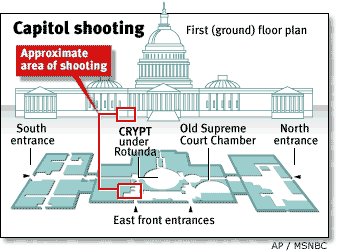
Capitol Police spokesman Dan Nichols said that after Chestnut was shot, the gunman turned down the first corridor and pushed through a door marked 'Private, Do Not Enter' which leads to a warren of offices used by DeLay. Once inside he was confronted by Gibson, who had already shouted to nearby staffers to take cover. The two men traded shots and both fell wounded, their bodies lying near an office photocopier. Another officer who ran to the scene straddled the bleeding gunman, pointing his weapon at him, an aide to DeLay said. Two of the wounded men were treated by Sen. Bill First, R-Tenn., who is a heart surgeon. A tourist who was shot in the episode, 24-year-old Angela Dickerson of suburban Virginia, was released from the hospital Saturday. Congress honors slain officers 'They died saving lives,' said Rep. Tom Delay, R-Texas 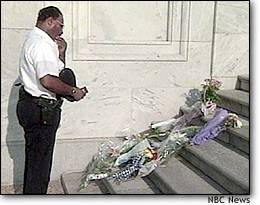
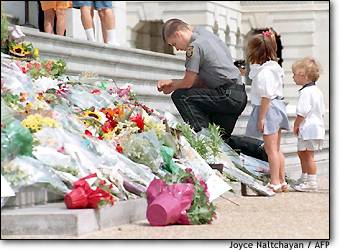
MSNBC LAWMAKERS PASSED legislation praising the slain officers, Jacob J. Chestnut and John Gibson, for their 'selfless acts of heroism,' and the House conducted no business during the day except to honor the two men. Also approved was a measure authorizing a memorial service for Tuesday in the Capitol's majestic Rotunda. Their coffins will lie in honor in the building throughout the day, an honor customarily reserved for presidents and other national leaders. 'These men died defending the Capitol of the United States of America, the symbol of freedom across the world,' said House Republican Whip Tom DeLay, his voice hoarse with emotion. 'They died saving lives,' added DeLay, for whom Gibson had served as a bodyguard. Later, DeLay was quoted as telling House members at a closed-door meeting that Gibson initially let the gunman run past him when he burst through the door to the whip's office last Friday. That way, when the gunman turned around to shoot, he was firing away from staff aides in the corridor rather than in their direction.
Leaders accord a rare tribute to fallen officers. Clinton, lawmakers honor 'ministers of democracy'. WASHINGTON, July 28 ' During a rare Rotunda ceremony, President Bill Clinton and other national leaders paid tribute Tuesday to the two police officers killed in last week's Capitol gun battle. 'They consecrated this house of freedom,' the president said. OFFICERS Jacob J. CHESTNUT and John Gibson were only the 26th and 27th Americans to be so honored in the Rotunda, in a tradition that began with the assassination of Abraham Lincoln.
The highest officials of government took their place among grieving family members, rows of dignitaries and waves of blue-clad police officers ' with all eyes turned to the two flag-draped caskets at the center of the circular chamber. 'They fulfilled their Lord's definition of a good life,' Clinton said. 'They loved justice. They did mercy. Now and forever, they walk humbly with their god.' Clinton broadened the scope of his remarks to praise police officers across the nation. 'We honor them today,' the president said of Chestnut and Gibson, 'and in so doing we honor the other thousands of officers ' including their colleagues ' who stand ready to do the same.' Vice President Al Gore quoted the Scripture's admonition that those who would be great should minister to the lowly, and called Chestnut and Gibson 'ministers of our democracy.' He said the two officers were 'watchmen who guarded not just a building, but an ideal.' Senate Majority Leader Trent Lott declared, 'The spirit of freedom is in this room because of these two men.' House Speaker Newt Gingrich consoled the families of the fallen, telling them, 'Your sacrifice is a painful but real building block of freedom.' Chestnut and Gibson were killed Friday by an intruder who shot his way into the Capitol Building. During Tuesday's ceremony, Capitol Police Chief Gary Abrecht warned others who might invade the Capitol that 'there are officers like J.J. and John who are determined to fill the breach' and protect the building and its visitors. EXTRAORDINARY HONORS
In the hours before the ceremony, hundreds upon hundreds of people filed around the focal point of the 'people's house,' paying their respects to the two officers. At noon, hundreds of members of Congress stood vigil over the caskets. The formal honors began Monday when Congress approved a resolution lauding the two men 'for the selfless acts of heroism they displayed on July 24, 1998, in sacrificing their lives in the line of duty so that others might live.' The resolution also provides funeral expenses plus a gift equal to a year's salary to their wives and children, and authorizes a plaque in the officers' honor to be placed in the Capitol. Both men were due to be buried at Arlington National Cemetery. Chestnut is an Air Force veteran, and the Army approved Gibson's interment there after it was requested by Gingrich, R-Ga., and House Minority Leader Dick Gephardt, D-Mo. The families of Chestnut and Gibson released statements, as well, expressing their their thanks for the sympathy they've received from public officials, as well as strangers from around country and the world. U.S. Leaders Honor Officers
By David Espo, Associated Press Writer WASHINGTON (AP) -- In mournful tribute beneath the Capitol dome, President Clinton praised two slain police officers Tuesday as heroes whose sacrifice ``consecrated this house of freedom.'' Lawmakers and thousands of visitors joined in a day long outpouring of sympathy. Jacob J. Chestnut and John Gibson, killed last Friday by a Capitol intruder, `died in duty to the very freedom that all of us cherish,'' said House Speaker Newt Gingrich.
The widows, children and other relatives of the slain men were seated for the memorial service, a few feet from the flag-draped coffins bearing the remains of their loved ones. All others in attendance stood. Customarily, only presidents, members of Congress and military commanders are permitted to lie in the Rotunda. Congress made an exception in the case of the two fallen officers, and by early morning, hundreds of people were in line outside the Capitol waiting to pay their respects. Some wept, some saluted, others simply stared at the caskets as the long line filed slowly up the Capitol steps and into the soaring Rotunda where the coffins rested. An honor guard, four Capitol Police officers in dress blue uniforms, stood somber watch. Joining the mourners were delegations of law enforcement officials from across the nation. The memorial service was unprecedented -- the nation's political leadership gathered in one of the most hallowed rooms in the land to mourn not a president or a general, but two men unknown outside their own communities. Standing in a room graced with images of George Washington, Abraham Lincoln and other famous Americans, Senate Majority Leader Trent Lott said, ``Today we honor two men that should rightly be recognized in this hall of heroes.... It's appropriate today that we honor these two men who did their job, who stood the ground and defended freedom.'' In his remarks at the brief ceremony, Clinton paid tribute to the ``quiet courage and uncommon bravery'' exhibited by Chestnut, Gibson and so many other police officers who are struck down in the line of duty. The two men killed last Friday, he said: ``in doing their duty they saved lives, they consecrated this house of freedom and they fulfilled our Lord's definition of a good life. They loved justice, they did mercy, now and forever, they walk humbly with their God.'' For the second straight day, the House canceled its legislative business out of respect for the two men who died while at their posts in the Capitol. ``In our hearts and in our minds, their heroism can never be forgotten,'' said Rep. Lynn Woolsey, D-Calif., one of several lawmakers to speak of the two men in the House during the day. ``Who could ever imagine a shooting in the nation's Capitol, a shrine to liberty and justice for all,'' added Rep. Constance Morella, R-Md. Across the Capitol, Sen. Ben Nighthorse Campbell, R-Colo., pinned a Capitol policeman's patch to his jacket -- a gift, he said, from Gibson a few weeks ago. The Rotunda was closed to the public for a while at midday to permit members of Congress to view the caskets. Gingrich, Democratic leader Dick Gephardt and House GOP Whip Tom DeLay, his wife and daughter formed a receiving line for fellow lawmakers. Gibson had served as DeLay's bodyguard. The scene in the Capitol's Rotunda was unprecedented as powerful lawmakers and tourists alike came to pay their respects to Chestnut and Gibson. First inside were Jeffrey Barrow, 13, and his father, Don, a locksmith from Atlanta, who had been in the Capitol Friday when the shooting broke out. ``I wanted to come and pay respects,'' said the boy. ``I've been asking myself why would he want to kill them. They didn't do anything to him.'' Many uniformed police officers also filed past, some of them wiping away tears, as the long, hot day wore on. Chestnut, who was 58, and Gibson, 42, will be buried later in the week at Arlington National Cemetery.
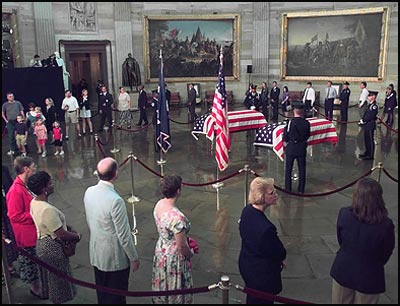
People pass by the caskets as they lay in honor at the Capitol Rotunda. (By Jo Marquette ' Associated Press)
SUSPECT IMPROVES
Authorities arranged a hearing in absentia for Weston on Monday in federal court, a few blocks from the Capitol. Papers filed in court in the District of Columbia on Saturday charged him with killing the two officers; the purpose of Monday's hearing is to bring the case into federal court. SUSPECT CONFUSED
Amid speculation that Weston ' once diagnosed as suffering from paranoid schizophrenia ' could plead insanity in his defense, prosecutors said it was much too early to make any definitive decisions about their case or whether they would seek the death penalty. 'We're preparing for all possibilities,' Assistant U.S. Attorney Channing Phillips said. Weston, 41, was being kept under sedation and heavily guarded in his hospital bed at D.C. General Hospital. Dr. Norma Smalls said wounds caused by bullets that tore through bones and blood vessels in an arm and leg required more surgery and risked causing a blood clot that could threaten his life. Weston 'is aware that he is a prisoner,' Smalls said. 'We are able to speak to him, but there is some confusion on his part.' Weston's court-appointed lawyer, A.J. Kramer, said he had been able to speak with his new client for 45 minutes Monday morning but declined to discuss Weston's condition or legal situation, other than to say, 'He's not in good shape' physically. MOTIVE KEY TO INSANITY DEFENSE Weston was diagnosed years ago as a paranoid schizophrenic who suffers from delusions. At times Weston believed the federal government was watching him through a neighbor's satellite dish or had spiked his land with mines. He once pestered a guard at the CIA's headquarters with claims that he and the president were clones. Should Weston's attorneys eventually decide to enter an insanity plea, such delusions may not be enough to make that case. Insanity is a legal classification that goes beyond a diagnosis of mental illness. Under federal law, to plead insanity it must be proven that a defendant suffers from severe mental illness and, at the time of the crime, was incapable of understanding the moral or criminal wrongfulness of what he or she did. Russell Eugene Weston Jr. in a 1991 Montana sheriff's booking photo. He was charged at the time for drug possession. 'We can have two paranoid schizophrenics committing the same act... and one could be found sane and one could be found criminally insane,' according to forensic psychiatrist Phillip Resnick, a consultant to prosecutors in the Unabomber and Oklahoma City bombing cases. 'Until you can find out his motive, and why he did what he did, you can't know' whether a defendant qualifies as insane, Resnick said. If Weston's lawyers decide to pursue an insanity claim, they first would ask a judge to order a 30-day psychiatric review, which probably would take place at the nearest federal prison, Phillips said. Such defenses are difficult to prove, relying not just on psychiatric evaluation but on witnesses' testimony and other evidence as well. Insanity defenses are rare, arising in about 1 percent of all criminal prosecutions, according to Dr. Paul Appelbaum, secretary of the American Psychiatric Association. When raised, the defense is only about 25 percent successful, he said. For Russell Weston's parents, the ordeal of being questioned by the federal officials is over, and now they are left alone with their grief and sorrow. NBC's Ed Rabel reports. Anyone found not guilty by reason of insanity would most likely be sent to a mental hospital instead of a prison. WESTON'S PARENTS APOLOGIZE Weston's parents, Russell Sr. and Arbah Jo, said Monday they hadn't spoken to their son since the shooting. 'I feel so bad about it,' Weston Sr. said on NBC, speaking from his home in Valmeyer, Ill. 'I feel so bad for the people that he killed. I apologize to the nation.' Weston's father said his son had a long history of mental illness, starting after he graduated from high school. To federal officials, Weston was a Secret Service nightmare. He visited CIA headquarters on July 29, 1996, sat with a CIA security officer and began to ramble, getting into 'some pretty bizarre stuff,' according to a government official who spoke on condition of anonymity. Weston claimed to have been cloned at birth, said that Clinton had been cloned at birth and claimed Clinton may have played a role in the Kennedy assassination out of anger at Kennedy 'for stealing his (Clinton's) girlfriend, Marilyn Monroe.' While Weston's motive for shooting the police officers is unclear, agents recovered some evidence from Weston's home: A logbook or diary and a voluminous amount of papers were recovered by FBI agents from his truck and home, according to law enforcement sources. They declined to describe the writings in detail, but there was an indication they revealed some instability. One law enforcement official said prosecutors did not want the writings discussed because they went to Weston's state of mind and might aid defense attorneys. Weston wrote several letters to Sen. Conrad Burns, R-Mont., MSNBC affiliate KERI in Helena, Mont., reported. Capitol police were reportedly investigating the contents of the undisclosed letters. By Michael
Grunwald and Cheryl W. Thompson Russell Eugene Weston Jr., a former mental patient from Montana, was charged yesterday with murdering two U.S. Capitol Police officers during a rampage in the Capitol building that allegedly began when Weston walked up behind an officer and shot him point-blank in the back of the head. Law enforcement sources and court documents added chilling new details yesterday about the Friday afternoon killings of Jacob J. Chestnut, 58, and John M. Gibson, 42, both 18-year veterans of the force. They said that after bursting through a Capitol security checkpoint and shooting Chestnut, Weston chased a screaming woman down a hallway until he was confronted by Gibson, who pushed the woman out of harm's way and exchanged deadly gunfire with the intruder. Weston, 41, slipped into unconsciousness and was downgraded early yesterday from stable to critical condition after surgery Friday at D.C. General Hospital. Doctors said he had a "50-50" chance of survival. He was ordered held without bond yesterday during a brief hearing in D.C. Superior Court. An FBI agent's affidavit filed in court says Gibson and another officer ' identified by law enforcement sources as Douglas B. McMillan ' fired at Weston several times. Angela Dickerson, a 24-year-old employee of a Virginia furniture store, was wounded by stray gunfire. She was released yesterday from George Washington University Medical Center. SECURITY TO BE REVIEWED For the second day in a row, Lott suggested swift action on a proposed visitors center for tourists that would also provide enhanced security. He said he would meet Wednesday with other lawmakers to try crafting a bill on the subject. But Lott has insisted that there would be no 'armed compound' established in a building long prized for its openness. Separately, the Senate agreed to add $14 million for unspecified security needs to a spending bill under consideration. NBC News correspondent Gwen Ifill and The Associated Press contributed to this report.
A tribute in the Rotunda (Reuters) The nation's week-long public mourning over the slayings of two U.S. Capitol Police officers turned to private sorrow Wednesday as family, friends and colleagues of slain Detective John M. Gibson remembered him in silent prayer and hushed words of comfort. Funeral Processions Likely to Snarl Traffic By Alice Reid, Washington Post Staff Writer Today's funeral procession for slain U.S. Capitol Police Detective John M. Gibson will be at least 12 miles long as it travels a 35-mile route from Prince William County to Arlington National Cemetery, and motorists should expect traffic tie-ups for much of the day, police said. (From) the U.S. Capitol and along the Mall, reaching the cemetery in the early afternoon. About 1,000 police cruisers will take part in the procession, ' © 1998 The Washington Post CO The Funerals Two Heroes, Many Tears Escorted by 14-Mile Motorcade, Detective Gibson Is Laid to Rest (By Marylou Tousignant and Patricia Davis Washington Post Staff Writers) On Shirley Highway overpasses, they waved tiny flags as the long funeral cortege passed. On the freeway below, they pulled over and climbed out of their cars, placing their hands over their hearts. On the streets of a grieving capital, small children were hoisted onto their parents' shoulders to watch this last journey of a hero they never knew. And on a sultry summer afternoon yesterday, beneath the shade of a red maple tree at Arlington National Cemetery, slain Capitol Police Detective John Michael Gibson was laid to rest. The 1,000-vehicle motorcade that traveled 35 miles from a Prince William County church to the Mall and then on to Arlington halted lunch-hour routines and, for many, became a somber reminder of American values. Along the Mall, souvenir and refreshment sales slowed to a trickle, and families picnicking on the grass looked up to catch a glimpse of the hearse carrying the body of Gibson, 42. Office workers, tourists and police officers saluted or placed their hands over their hearts as it passed, some in tears. The motorcade stretched for more than 14 miles and took about a half-hour to pass by. It began after Gibson's funeral at St. Elizabeth Ann Seton Catholic Church in Lake Ridge, traveled up Interstates 95 and 395 and went past the U.S. Capitol, where Gibson worked for 18 years and where he was slain last Friday. Law enforcement officers turned out in droves, from as far away as California and Canada, to lead the tribute to Gibson, whom mourners described as an ordinary man who did an extraordinary thing in sacrificing his life to save others in the shootout. "You didn't have to know him personally," said Sgt Thomas Maksym of the Nassau County (N.Y.) Police Department, holding a damp handkerchief as he stood at Gibson's grave site. "You know the risks he faced every day. It could have been you." Thousands of onlookers lined the funeral route, waiting in the blistering heat for the cortege to pass. An honor guard of 260 motorcycle officers led the way. As the procession traveled up Shirley Highway in the center car-pool lanes, vehicles in the north and southbound lanes pulled to the shoulders, and motorists got out to watch. About 130 people waited at the Seminary Road overpass in Alexandria, some arriving 90 minutes before the motorcade started to come by at 12:30 p.m. Christine DeRiso, who once worked for the Montgomery County police, was moved to tears as she watched the long line of police cars and motorcycles. "That's why they call it a brotherhood," said DeRiso, 30, of Sterling. Gibson and another 18-year Capitol Police veteran, Officer Jacob J. Chestnut, 58, were killed when an armed intruder rushed past a security checkpoint in the Capitol. Chestnut was shot without warning near the visitors' entrance. Gibson, a plainclothes officer assigned to protect House Majority Whip Tom DeLay (R-Tex.), was fatally wounded in an exchange of point-blank gunfire with the assailant. DeLay and others have said that Gibson's quick actions saved many other people's lives. The suspect, Russell Eugene Weston Jr., 41, is in D.C. General Hospital, continuing to recover from his gunshot wounds. At his funeral Mass, Gibson was remembered as a loving husband and father of three teenage children; a devoted, disciplined law enforcement officer; and a transplanted Bostonian who never lost his accent or his love of baseball's Red Sox and hockey's Bruins. The assembled congregation, which included DeLay and several other lawmakers and Hill aides, quickly filled the 1,500 seats for the 10 a.m. service, spilling over into the nearby parish hall and onto the sidewalks. When the Capitol Police ceremonial unit arrived, two dozen members quietly exited the bus. While straightening their dress uniforms and buffing their leather straps, the officers kept their hats low over their eyes and shook their heads solemnly. "It's just too difficult," one officer muttered as he prepared to get in formation. Among the last to arrive, walking slowly up the long driveway leading to the red-brick church, were Sen. Edward M. Kennedy (D-Mass.) and his wife, Victoria, who held hands as they entered the building. Kennedy said earlier that he empathized with the two officers' families because "my family, too, has suffered the sudden loss of loved ones, and I know that there is no greater tragedy, no greater sadness for a family." Chestnut's family, who will bury their loved one at Arlington today, also attended Gibson's services to offer support and comfort to his widow, Lynn, and the couple's three children. The Gibsons will do the same at Chestnut's funeral today in Fort Washington. "John truly loved his work," Gibson's longtime friend, Capitol Police Sgt Jack DeWolfe, said in his eulogy. But his "greatest accomplishment in life was marrying Lynn and having Kristen, Jack and Danny. You were his whole world," DeWolfe said. "John, my best friend, I love you. I will miss you," DeWolfe concluded, his voice starting to crack. "You will be in my heart forever." John Arnold, 15, a friend of Jack Gibson's whose father is also a police officer, said the Capitol shootings were traumatic for officers' families. "My best friend just lost his dad, and it could have happened to me," he said. Joining the mourners was Holly Balcom-Mensch, who taught both Gibson boys in fourth grade at Lake Ridge Elementary School, where Lynn Gibson is a crossing guard. Balcom-Mensch said she wrote the boys a letter in which she said that their father died a brave man and that his legacy would always be a part of them. Outside the church, neighbors lined the streets of the quiet suburban neighborhood, awed by the turnout and the emotion evoked by the ceremony. Some offered drinks to police officers and reporters, and one woman sewed a button on an officer's coat for him. Shortly after noon, the motorcycles led the cortege away from the church, riding two abreast, their blue and red lights flashing. As the procession turned onto Old Bridge Road, it passed under the extended ladders of two firetrucks, a large U.S. flag suspended between them. Spectators gathered along the grassy median and shoulders of the road leading to the interstate. They stood in front of shops, gas stations and convenience stores, some with signs, others with more flags, large and small. In Washington, when the first motorcycles came into view over the 14th Street bridge, a hush fell over the crowd, and parents standing two and three-deep on the sidewalk lifted their children to see the procession. "As people started watching, there was just a quietness," said Charles Houston, 51, a truck driver who lives in the District. "When something like this tragedy happens, it awakens something in all of us, and you see a unity among people. This is going to be a part of history, remembered for a long time." As the motorcade slowly wound its way around the Mall, onlookers snapped photographs, while others were brought to tears. Bikers, joggers and tourists saluted or held their hands over their hearts as Gibson's hearse passed them. Jonathan Stephens, 45, who works for the U.S. Forest Service, said he wanted to show his respect because he once worked as an administrative aide at the Capitol. "It just gives you the chills to see this," he said. "The pomp and circumstance of the procession is overwhelming." In the crowd of 500 people gathered on the Capitol's west side was 11-year-old Eugene Herring of Hamilton, N.J. "This is sad, that a maniac can come to the Capitol and shoot police," he said, adding that "all these people have come out of respect because those officers did their job as they were supposed to do." George Anderson, visiting Washington from his home in Clearwater, Fla., learned that the funeral procession was coming as his family waited in line at the Bureau of Engraving and Printing and decided to stay and watch. "It touched me, the way the whole nation was touched by it," he said of the shootings in one of the nation's most treasured buildings. "It's just [a] horrible waste. One insignificant person made such an impact on so many people today." As the hundreds of police motorcycles and cars -- first appearing in the summer haze as one giant, unified vehicle -- rounded the Lincoln Memorial and started over Memorial Bridge, a red D.C. rescue boat in the Potomac River shot streams of water several hundred feet into the air. A line of officers on horseback met the procession at the cemetery's front gate.
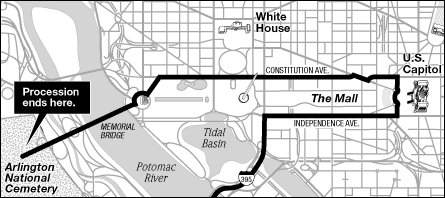
When a cadre of officers waiting at Gibson's grave site learned that the motorcade had arrived -- more than an hour after it had left the church -- they fell silent and snapped to attention. Soon the haunting sounds of police bagpipers from Chicago and New York could be heard across the nation's most hallowed military cemetery. Although Gibson was not a military veteran, he was granted special permission to be buried at Arlington. His grave, under a shady red maple tree in Section 28, is in "a peaceful part of the cemetery," said Arlington historian Tom Sherlock, "off the beaten track." As four police helicopters flew past in tribute, several officers in full dress uniforms began succumbing to the heat. Some were led away to air-conditioned buses. Although not a military funeral, the half-hour service included a 21-gun salute and the sounding of taps. Lynn Gibson, her children seated next to her, was presented with the American flag that had draped their father's coffin. At the end of the ceremony, she slowly stood and, leaning forward, placed a long-stemmed red rose on her husband's casket. Carved into the polished dark wood surface was the name "John Michael Gibson" and the emblem of the police department he so loved. (Funeral Coverage: Contributing to The Post's coverage of U.S. Capitol Police Detective John M. Gibson's funeral were staff writers Erica Beshears, Justin Blum, Jennifer 8. Lee, Ann O'Hanlon, Linda Wheeler and Josh White. ' © 1998 The Washington Post CO) Jacob Chestnut laid to rest The motorcade
reached the grave site about 2 p.m. Chestnut's grave is at one
of highest points in the cemetery, a place once known as Freedman's
Village.
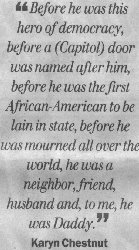
The Vietnam Security Police Association, Inc. (USAF) reported that JJ Chestnut had signed up for he and his wife to attend this year's reunion. VSPA Officers have decided to dedicate this year's reunion in memory of JJ. VSPA members assemble for the final Guardmount and roll call at J.J. Chestnut's gravesite, Arlington (Section 4, #2764A), on October 10th, 1998. Gravesite photos: Left foreground, Steve Ray, Mike Daoust, Steve Janke [chaplain]. Photo by Liz Shelt, Pat
Jacob Chestnut
Arrangements for flowers and contributions are in progress. Anyone wishing to contribute to the fund may do so by writing the below address. All funds --100%--raised will go directly to the families of Jacob Chestnut and fellow officer John Gibson. Single checks will be given to the families by the VSPA. Family wishes, when known, will be respected by the Association. The VSPA will post at this location the total funds raised and the distribution made.
|
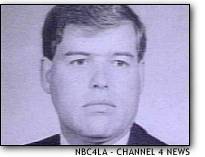 Capitol Police Officer Jacob Chestnut, Vietnam Veteran, and member
of the Vietnam Security Police Association, Inc. (USAF), was killed
in the line of duty at the Capitol building in Washington D.C.
on Friday July 24, 1998. Fellow officer John Gibson (photo right)
was also fatally wounded by the gunman. During the gun battle
officers struck down the suspect with five gunshot wounds.
Capitol Police Officer Jacob Chestnut, Vietnam Veteran, and member
of the Vietnam Security Police Association, Inc. (USAF), was killed
in the line of duty at the Capitol building in Washington D.C.
on Friday July 24, 1998. Fellow officer John Gibson (photo right)
was also fatally wounded by the gunman. During the gun battle
officers struck down the suspect with five gunshot wounds.
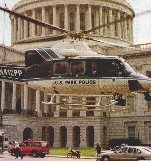 "U.S. Capitol police officer Jacob Chestnut sacrificed his life
in an attempt to stop the gunman." Two Capitol police officers,
Jacob Chestnut and John Gibson, were fatally wounded by the gunman,
later identified as 41-year-old Russell Eugene Weston of Missoula,
Montana, and formerly of Valmeyer, Ill. Weston's car, with expired
plates, was found near the Capitol.
"U.S. Capitol police officer Jacob Chestnut sacrificed his life
in an attempt to stop the gunman." Two Capitol police officers,
Jacob Chestnut and John Gibson, were fatally wounded by the gunman,
later identified as 41-year-old Russell Eugene Weston of Missoula,
Montana, and formerly of Valmeyer, Ill. Weston's car, with expired
plates, was found near the Capitol.
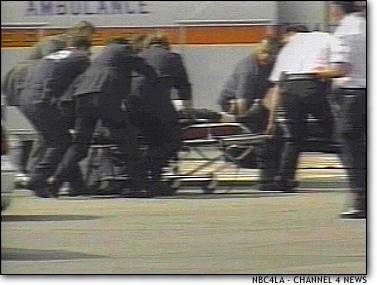
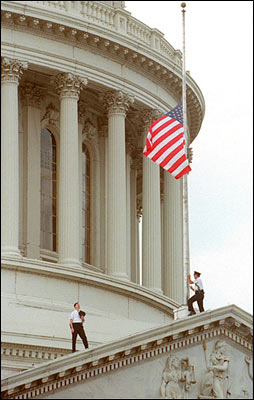 A flag at the Capitol is lowered to half-staff in honor of
slain U.S. Capitol Police Agent John Gibson and Officer Jacob
J. Chestnut. (AFP)
A flag at the Capitol is lowered to half-staff in honor of
slain U.S. Capitol Police Agent John Gibson and Officer Jacob
J. Chestnut. (AFP)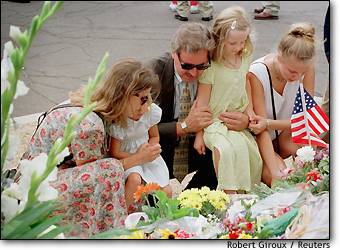 'Those wishing to pay their respects may file past the remains,'
Capitol Police Chief Gary Abrecht said Sunday. An afternoon service
is planned, with members of Congress, other officers and families
of the slain men in attendance, he said.
'Those wishing to pay their respects may file past the remains,'
Capitol Police Chief Gary Abrecht said Sunday. An afternoon service
is planned, with members of Congress, other officers and families
of the slain men in attendance, he said.
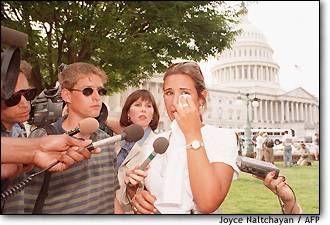 WASHINGTON, July 24 ' During the shooting and in the moments that
followed visitors to the Capitol recall scenes of violence and
fright. Some, including Sen. Bill First, R- Tenn, a heart surgeon,
attempted to help the victims.
WASHINGTON, July 24 ' During the shooting and in the moments that
followed visitors to the Capitol recall scenes of violence and
fright. Some, including Sen. Bill First, R- Tenn, a heart surgeon,
attempted to help the victims.
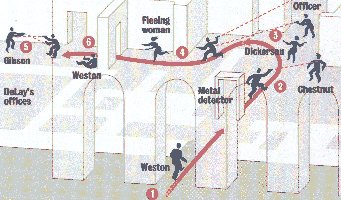
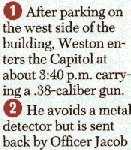
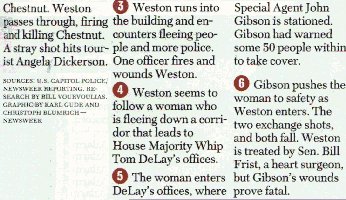
 WASHINGTON, July 27 ' United in mourning, Congress grieved Monday
for two police officers who 'died saving lives,' cut down when
a gunman invaded the Capitol. The suspect, recovering from his
wounds in a hospital, was charged in federal court and met with
his court-appointed attorney.
WASHINGTON, July 27 ' United in mourning, Congress grieved Monday
for two police officers who 'died saving lives,' cut down when
a gunman invaded the Capitol. The suspect, recovering from his
wounds in a hospital, was charged in federal court and met with
his court-appointed attorney.
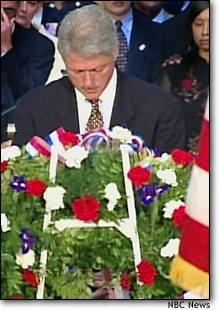 President Bill Clinton places a memorial wreath before the caskets
of the two slain officers during Tuesday's Rotunda ceremony.
President Bill Clinton places a memorial wreath before the caskets
of the two slain officers during Tuesday's Rotunda ceremony.
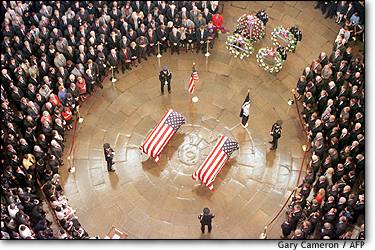 Police officers stand guard in the Capitol Rotunda as the bodies
of Jacob Chestnut and John Gibson lie in state.
Police officers stand guard in the Capitol Rotunda as the bodies
of Jacob Chestnut and John Gibson lie in state.
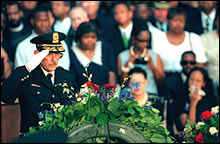 Capitol Police Chief Gary L. Abrecht salutes John Gibson and
Jacob J. Chestnut. (AFP)
Capitol Police Chief Gary L. Abrecht salutes John Gibson and
Jacob J. Chestnut. (AFP)
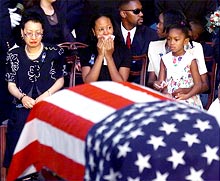 Wen Chestnut, widow of slain officer Jacob Chestnut, and other
family members grieve as they attend the Congressional tribute
at the Capitol Rotunda Tuesday. (Reuters)
Wen Chestnut, widow of slain officer Jacob Chestnut, and other
family members grieve as they attend the Congressional tribute
at the Capitol Rotunda Tuesday. (Reuters)
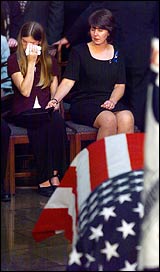 Evelyn Gibson (right), widow of slain officer John Gibson,
consoles her daughter Kristen during the Congressional tribute
at the Capitol Rotunda. (AFP)
Evelyn Gibson (right), widow of slain officer John Gibson,
consoles her daughter Kristen during the Congressional tribute
at the Capitol Rotunda. (AFP)
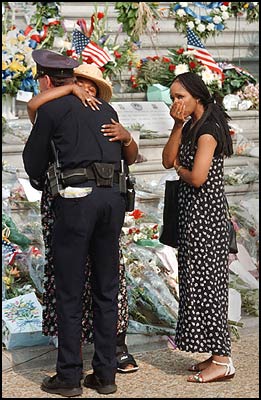
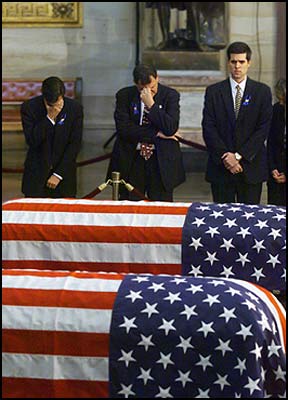
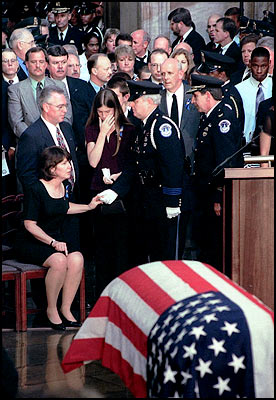
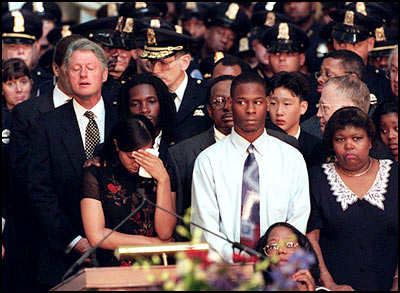
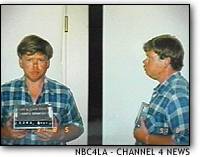 A mug shot of Russell Eugene Weston, who opened fire inside the
U.S. Capitol building Friday. Suspect Russell Weston remains in
guarded condition with gunshot wounds from Capitol Police officers.
Russell is known for prior threats against the President of the
United States.
A mug shot of Russell Eugene Weston, who opened fire inside the
U.S. Capitol building Friday. Suspect Russell Weston remains in
guarded condition with gunshot wounds from Capitol Police officers.
Russell is known for prior threats against the President of the
United States.
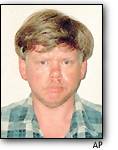 The condition of the suspect, Russell E. Weston Jr., 41, from
Rimini, Mont., was upgraded from critical to serious during the
day. 'His cardiac status has improved,' said D.C. General Hospital
spokeswoman Donna Lewis Johnson. Weston was shot in the chest,
arms, thigh and buttocks and brought down in a furious exchange
of gunfire with Gibson.
The condition of the suspect, Russell E. Weston Jr., 41, from
Rimini, Mont., was upgraded from critical to serious during the
day. 'His cardiac status has improved,' said D.C. General Hospital
spokeswoman Donna Lewis Johnson. Weston was shot in the chest,
arms, thigh and buttocks and brought down in a furious exchange
of gunfire with Gibson.
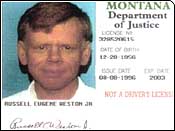 The shooting suspect, Russell E. Weston Jr., remained in stable
condition Tuesday but faced further surgery. On Monday, U.S. Magistrate
Judge Deborah Robinson said she would evaluate Weston's case 'day
by day,' with arraignment and additional charges possibly delayed
until he is healthy enough to appear in court. Weston already
is charged with murder in the Friday gunfight that killed the
two officers and wounded a tourist.
The shooting suspect, Russell E. Weston Jr., remained in stable
condition Tuesday but faced further surgery. On Monday, U.S. Magistrate
Judge Deborah Robinson said she would evaluate Weston's case 'day
by day,' with arraignment and additional charges possibly delayed
until he is healthy enough to appear in court. Weston already
is charged with murder in the Friday gunfight that killed the
two officers and wounded a tourist.
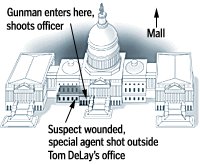 Murder Charges Filed in Capitol Rampage
Murder Charges Filed in Capitol Rampage 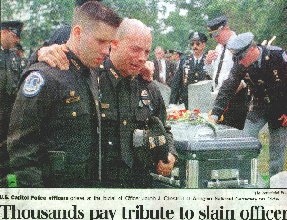 Soon, Chestnut's family emerged from the cars and took their places
in velvet-covered seats beneath an ivy-covered cherry tree. One
thousand arms saluted as the Air Force Honor Guard carried the
coffin to the grave site. A seven-person Air Force firing party
shot three volleys, a 21-gun salute. Then a lone bugler played
taps, and as the sad strains carried over the cemetery, Chestnut's
wife, and many others, began weeping.
Soon, Chestnut's family emerged from the cars and took their places
in velvet-covered seats beneath an ivy-covered cherry tree. One
thousand arms saluted as the Air Force Honor Guard carried the
coffin to the grave site. A seven-person Air Force firing party
shot three volleys, a 21-gun salute. Then a lone bugler played
taps, and as the sad strains carried over the cemetery, Chestnut's
wife, and many others, began weeping.